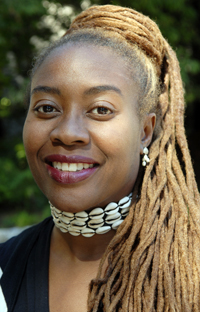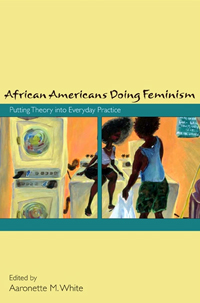Social psychologist Aaronette M. White believes in living feminism not just talking about it.
In her new book, African Americans Doing Feminism: Putting Theory into Everyday Practice (SUNY Press, 2010), the associate professor of psychology at UC Santa Cruz collects the personal reflections of 18 individuals who are living feminism or practicing it in their everyday lives.
The writers range from an 87-year-old lesbian living in an all-lesbian RV park in Arizona to a health department executive in St. Louis to White herself.
The book began about seven years ago when White, who describes herself as "a feminist psychologist who studies identity," asked for submissions of essays recounting a feminist issue and how one dealt with it. She posted her query on women's studies and women's group list-serves.
"I wanted a mix – definitely not just academics – men and women, and different generations," White said. She heard from activists, writers, scholars, and just plain folks.
The result is a collection of intimate stories by people applying feminist principles to everyday situations. "People taking huge risks, telling very, very personal stories," stories of incest, rape, violence, White says, including some of her own.
"Part of being a feminist is breaking the silence," she said, "not being ashamed of things that were not your fault." Only two writers use pseudonyms, a nun who writes about rape by priests and a participant in 12-step programs.
White has a very clear definition of feminism: "An ideology that addresses the imbalance of power between men and women. If you believe that that imbalance exists and should be corrected and act on that, you are a feminist."
The key is to act on it, she says, "otherwise you are just an armchair intellectual."
White believes feminist studies too often drifts into theory unconnected with everyday practice. Also feminism is frequently seen as a white issue. Black feminism is either ignored in academia or not understood.
White said she selected stories from African Americans that are grounded in day-to-day experiences, based on theory, real life examples of feminism in action on such issues as personal finance, parenting, sexual harassment, romance, parenting, reproductive freedom, depression, and addiction.
As editor she supplemented the material with citations and additions. "I learned a lot," White says now. "I met all these new people. It was truly a labor of love, life changing."
This is White's second collection of personal stories. Her earlier book, Ain't I a Feminist? African American Men Speak Out on Fatherhood, Friendship, Forgiveness, and Freedom (SUNY Press, 2008), focused on the feminist experiences of black men.
Currently, she is working on two other books based on a year teaching and conducting research in Ethiopia on a Fulbright Fellowship. She taught a masters level course on feminist theory at Addis Abba University for a newly founded gender studies program that will result in one book describing how Ethiopian women apply feminist theory in their everyday lives.
The second book will be based on her interviews with female combat veterans ages 20 to 55 who fought in Ethiopia's 17-year civil war. She is interested in the female perspective on violence, how it differs among generations, and how the former warriors transition back to civil society in Ethiopia and in other African countries.




